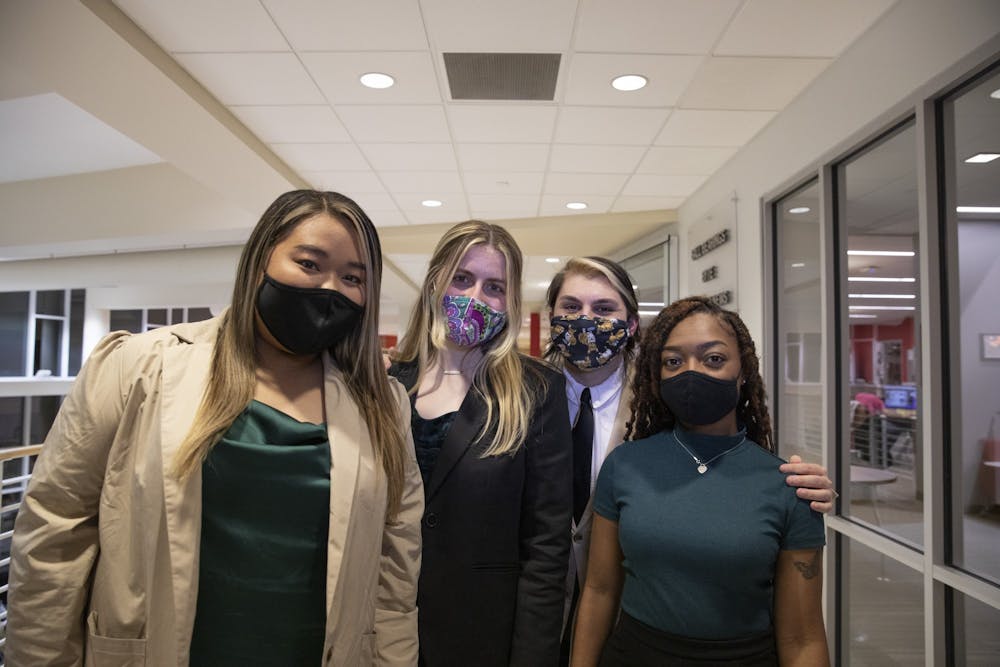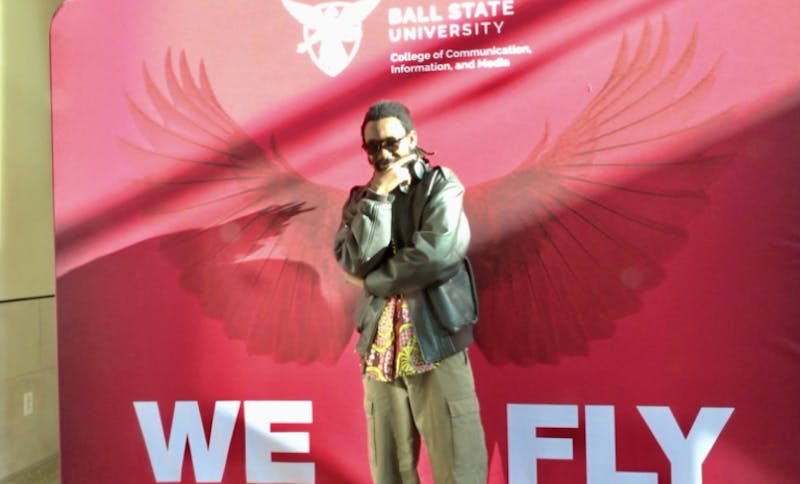When campaigning to become the 2021-22 Student Government Association (SGA) executive slate, Strive promised to concentrate on four different focuses. Strive was the first slate to successfully be elected on focuses rather than platform points, earning 460 votes, or about 70 percent of student voter support, with the remaining votes going to the no confidence option.
Strive consisted of President Tina Nguyen, Vice President Chiara Biddle, Treasurer Jacob Bartolotta and Chief Administrator Nita Burton — who resigned March 2.
The slate’s four focuses were engage, encourage, educate and strive. Slate members chose focuses because of the flexibility and adaptability they provided, Nguyen said.
“We wanted a different approach from other slates,” Nguyen said. “[Platform points] are a to-do list [and] with focuses, there's more of other voices that get combined.”
The engage focus meant to engage Ball State’s student body and increased campus awareness of the organization. The encourage focus meant to encourage sustainable practices and open communication between the student body and Dining Services. The educate focus aimed to educate the student body on diversity, and the strive focus was to advance the overall goal of a better university, as well as a constant improvement of SGA, Ball State and the student experience, slate members said.
Completed = Focus has been fully achieved.
Somewhat completed = Progress has been made on the focus, but the original goal was not entirely met.
Not completed = Focus has not been achieved.
Engage: Somewhat completed
What they said: To better engage with students, SGA hosted tabling events and town halls to discuss and engage in student interests. Strive worked with hall councils “to give students a direct line of communication,” Bartolotta said.
Strive members and senators hosted tabling in the Atrium, at the Scramble Light and at the Student Center. Students showed up to communicate their concerns and ideas to SGA and the biggest of these concerns, Bartolota said, involved parking and ticketing practices at Ball State. Other concerns brought up involved menstrual product access and Dining Services.
What we found: SGA acted on student concerns regarding parking services, feminine hygiene products and dining services. While progress has been gradual, SGA has advanced plans to satisfy student needs in these areas. The Daily News could not find an exact number of students who joined or participated.
What they said: In an effort to improve temporary parking for visitors and students at Ball State, in September 2021, Strive presented a parking lot project to Ball State’s Parking Services to transform the R2 lot next to the Robert Bell and David Letterman buildings into an hourly paid parking lot.
“The director of Parking Services was completely on board with the idea,” Bartolotta said.
Plans for developing hourly parking have been submitted to Ball State Parking Services and will remain under its control for future implementation.
What we found: Nicholas Capozzoli, Parking Services manager, said via email that “nothing has been converted yet,” and that while the R2 lot “has been discussed as a possibility,” Parking Services is still discussing the best location for an hourly pay lot for the fall 2022 semester.
Encourage: Somewhat completed
What they said: Biddle took charge of organizing the Dining Advisory Board, which is now a permanent partnership according to SGA’s constitution.
The Dining Advisory Board is meant to serve as a direct line of communication from Ball State students to Dining Services by establishing a permanent partnership with SGA and Ball State Dining. Students can voice complaints and concerns about dining to the board, Biddle said.
What we found: The first meeting of the board took place in November 2021, Karen Adkins, senior director of auxiliary services for dining, catering and events, said. The board met monthly from November to March focusing on University Dining for 2022.
The volunteer-based board has eight members on it, and Adkins and Biddle did social media advertising starting in October, said SGA graduate student adviser Zackary DeBroux.
What they said: To encourage sustainability, Strive launched the “Reduce Campaign” to use fewer paper products in senate meetings.
The Reduce Campaign encouraged students to be less wasteful, especially in dining halls. Biddle made a video for this campaign with Dining Services, which hasn’t been launched yet.
SGA hosted “dining satisfaction surveys” in different dining halls during the 2021 spring semester as part of this campaign, which received more than 300 responses, slate members said. The data from these surveys were used, and will be used, by the Dining Advisory Board to improve dining, Biddle said.
In an effort to make SGA paperless, Biddle said Strive incorporated digital meeting agendas and digital legislation into senate meetings instead of printing them.
What we found: In the Reduce Campaign video, Biddle and Adkins discuss green alternatives to use in the dining halls, such as reusable dining bags.
Educate: Somewhat completed
What they said: To educate students on diversity, Strive and SGA organized two major events: the collaboration with SafeZone training and the “Diversity Deep Dive.”
Bartolotta led the SafeZone training initiative, designing buttons and pins for around 25 different sexual orientation identities and ten different pronouns.
Bartolotta said the buttons also had an option where students could write their own identity.
SGA and SafeZone volunteers tabled to ask for student feedback in the L.A. Pittenger Student Center March 2022. At this tabling event, SGA spoke to more than 500 students and staff, and passed out 1,000 buttons, Bartolotta said.
What we found: After the previous Bold slate designed t-shirts for SafeZone training in the 2020-21 term, Strive built on top of the initiative with other promotional items.
“Pronoun pins help initiate, foster and normalize the conversation about pronouns,” said Kiara John, SafeZone Coordinator, in an email.
John said SafeZone printed pronoun pins before its collaboration with SGA, but it used to sell pins for 50 cents to a dollar depending on the size. The SGA partnership allowed SafeZone to distribute these pins on a larger scale and to provide them for free, John said.
John said SGA designed the pins, provided funding and provided volunteers to distribute the pins.
What they said: For the “Diversity Deep Dive,” Nguyen met with multiple cultural groups on campus to discuss cultural differences and similarities. Strive worked primarily with the Multicultural Center and the Big Four — Asian American Student Association, Latinx Student Union, Black Student Association and Spectrum.
Nguyen described the “Diversity Deep Dive” as “an educational programming type of shindig for our students to understand what it means to be diverse, because diversity is more than what you look like on the outside as opposed to what makes us us.”
What we found: The first “Diversity Deep Dive” SGA held October 6, 2021, was about cultural identity and sexuality, and the second one, April 7, involved political identity. The student senate’s Diversity and Multicultural Committee (DMC) helped host the political identity Diversity Deep Dive.
Strive: Somewhat completed
What they said: Slate members said the parking lot project developed under the engage focus also fits into the goal of striving for a better student experience and university.
To expand resources for free menstrual products, Strive started an initiative to make menstrual products available in residence halls, which is currently only available in the Studebaker West Complex.
Nguyen confirmed the program is fully funded by SGA and that menstrual products are restocked weekly.
Strive also began conversations with other campus organizations to look into opening an emergency center next year that can provide clothing, hygiene tools and menstrual products.
What we found: A location for the emergency center hasn’t been decided, said Sean Sheptoski, assistant director for student leadership.
The residence hall menstrual product pilot program began April 18 in Studebaker West, according to an email from Erica Gleason — Studebaker West Complex hall director. Joseph Gassensmith, SGA chief of staff, said progress in this initiative will be continued by the new executive ticket, RISE.
Hannah Amos and Richard Kann contributed to this story.





The Daily News welcomes thoughtful discussion on all of our stories, but please keep comments civil and on-topic. Read our full guidelines here.